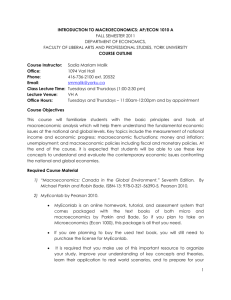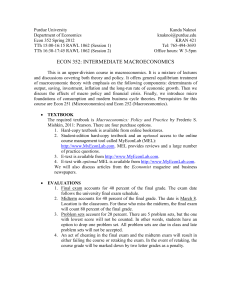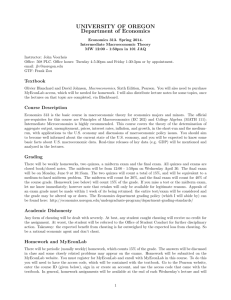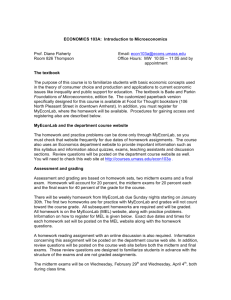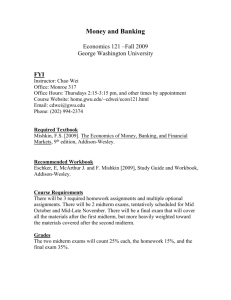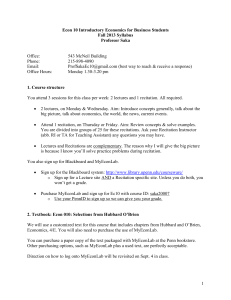1 introduction to microeconomics: ap/econ 1000 m winter semester
advertisement
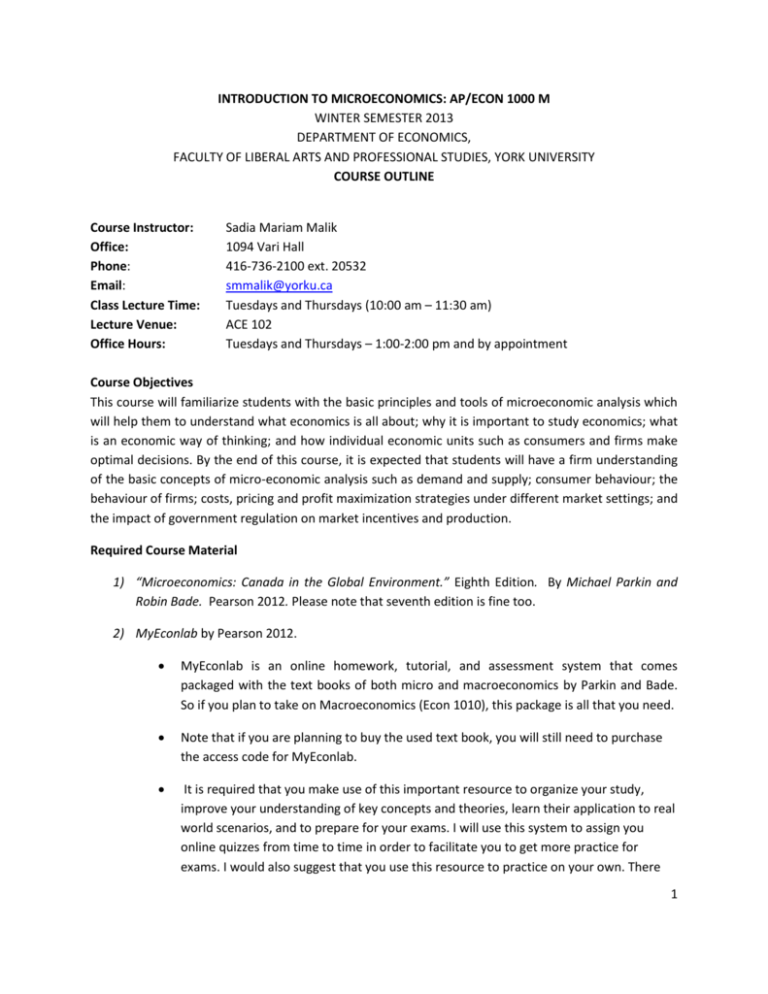
INTRODUCTION TO MICROECONOMICS: AP/ECON 1000 M WINTER SEMESTER 2013 DEPARTMENT OF ECONOMICS, FACULTY OF LIBERAL ARTS AND PROFESSIONAL STUDIES, YORK UNIVERSITY COURSE OUTLINE Course Instructor: Office: Phone: Email: Class Lecture Time: Lecture Venue: Office Hours: Sadia Mariam Malik 1094 Vari Hall 416-736-2100 ext. 20532 smmalik@yorku.ca Tuesdays and Thursdays (10:00 am – 11:30 am) ACE 102 Tuesdays and Thursdays – 1:00-2:00 pm and by appointment Course Objectives This course will familiarize students with the basic principles and tools of microeconomic analysis which will help them to understand what economics is all about; why it is important to study economics; what is an economic way of thinking; and how individual economic units such as consumers and firms make optimal decisions. By the end of this course, it is expected that students will have a firm understanding of the basic concepts of micro-economic analysis such as demand and supply; consumer behaviour; the behaviour of firms; costs, pricing and profit maximization strategies under different market settings; and the impact of government regulation on market incentives and production. Required Course Material 1) “Microeconomics: Canada in the Global Environment.” Eighth Edition. By Michael Parkin and Robin Bade. Pearson 2012. Please note that seventh edition is fine too. 2) MyEconlab by Pearson 2012. MyEconlab is an online homework, tutorial, and assessment system that comes packaged with the text books of both micro and macroeconomics by Parkin and Bade. So if you plan to take on Macroeconomics (Econ 1010), this package is all that you need. Note that if you are planning to buy the used text book, you will still need to purchase the access code for MyEconlab. It is required that you make use of this important resource to organize your study, improve your understanding of key concepts and theories, learn their application to real world scenarios, and to prepare for your exams. I will use this system to assign you online quizzes from time to time in order to facilitate you to get more practice for exams. I would also suggest that you use this resource to practice on your own. There 1 are a number of practice tests available that will instruct you in case you make a mistake and will help you organize your study accordingly. Although MyEconlab can be assessed online through www.myeconlab.com. You will need the following to access MyEconlab: 1) An access code that is provided when you purchase the new textbook or purchase the program separately 2) Course ID which is malik50852 3) A valid email address. In order to familiarize you with MyEconlab, I will arrange an orientation session in the first week of the semester. Round the clock technical support is also available with the publisher in case you experience any difficulty in using the software. 3) Study Guide accompanying the required text book by Parkin and Bade. The study guide is not a required text and it is entirely up to you to study it for more practice and greater understanding. Evaluation The assessment of your results in the course will be based upon one midterm exam, a final exam and online quizzes. I will assign you a total of six online quizzes during the course of the semester and will drop the two lowest scored quizzes at the end of the semester. The contribution of each of these in the final grades will be as under: Midterm Exam 30% Final Exam 50% Online Quizzes 20% Total 100% Exam Dates and Rules Tentative date for the midterm exam is Thursday, February 28, 2013. The final exam will be held in the period of April 10-26, 2013. The precise date for the final exam will be announced later. Both midterm and final exams will consist of multiple choice questions. Midterm exam will cover everything that we will be able to cover from the first day of class till the last lecture before the midterm. The final exam will be comprehensive with 75-80 percent of the questions selected from the post midterm material and the remaining 20-25 percent of the questions from the premidterm material. No student will be allowed to write the exam prior to the scheduled date. No student will be allowed to write the exam in order to improve the letter grade. 2 York University is committed to respecting the religious beliefs and practices of all members of the community. In case, any of the exam dates clash with the day of your religious observance, you are responsible for contacting me at least two weeks in advance. To arrange for an alternative date, you must complete an examination Accommodation Form available at http://www.registrar.yorku.ca/pdf/exam_accommodation.pdf Cheating and plagiarism are considered to be serious offences by York University. Please visit the Academic Integrity web site http://www.yorku.ca/acadinte/students/index.htm to read the Senate Policy on Academic Honesty. Cell phones, electronic translators, programmable calculators, iPods, MP3 players, and other electronic devices are not permitted into exams. You will only be allowed the use of nonprogrammable calculator and English language dictionaries. Other permissible items to carry in exams are pens, pencils, student ID, coats and purses. Make-up Exams Policy No make-up exams will be given for a missed midterm exam. If for any reason you miss a midterm, your final exam will have a greater weight and will count towards 100 percent of your total points earned, instead of 60 percent. In case you miss the final exam, you will be allowed to write a deferred exam only by completing the Deferred Standing Agreement Form and by providing a completed Registrar's Office Attending Physician's Statement. Grade Distribution based on Percentages Earned The grade distribution will be based upon the total percentage points that you will earn in the semester. The standard cut-off points, provided by York University, will be used to convert percentages to letter grades. These are provided as under: 90-100 A+ 80-89 A 75-79 B+ 70-74 B 65-69 C+ 60-64 C 55-59 D+ 50-54 D 40-49 E 0-39 F Organization of the Course This course consists of six lecture hours per week. Lecture notes and power point presentations will be made available online through the course website. The link for the course website is: http://jacinth.eso.yorku.ca/LotusQuickr/2013w-apecon1000m-03/Main.nsf 3 Once you are on your course website, please make sure that you log in using your passport York Account in order to access lecture slides and other course materials. Teaching Assistants will be available for further help. Their names and office hours will be announced later in the class and on the course website. Topics to be Covered and Lecture Schedule Week of Topic Assigned Corresponding the Text January 8 Introduction/Administration Course Outline Readings/ Chapter in What is Economics and Chapter 1 Economic Way of Thinking? Key Principles and Concepts January 15 The Economic Problem and the Chapter 2 Emergence of a Market Economy January 22 How Markets Work? The Crucial Chapter 3 Tools of Demand and Supply January 29 Elasticity Chapter 4 February 5 Efficiency and Equity Chapter 5 February 12 Possibilities, Choices Preference and Chapter 9 Reading Week: February 16-22, 2013 February 26 Midterm Review Midterm: February 28, 2013 March 5 Organizing Production Chapter 10 March 12 Outputs and Cost Chapter 11 March 19 Perfect Competition Chapter 12 March 26 Monopoly Chapter 13 4 April 2 Final Exam Review Final Exam Date to be announced by the University’s registrar Course Work Econ 1000 is not a straightforward course. Many of the concepts may appear simple but their application requires deeper understanding and clarity. Students are advised to devote ample time (at least 5 hours per week) to study for this course. Although power point presentations and lecture notes will be made available online, these should not be considered as substitutes for reading the appropriate chapters in the text. Reading the textbook and studying other assigned course material are vital to improve your understanding of basic economic concepts and theories and to get good grades. However, remember that there is a world outside the text book and it is important to learn how to apply your text book knowledge to real world situations. In this context, reading Wall Street Journal, Financial Times, or Economist regularly is a smart idea. These news journals deal with business and economic news that are useful to remain abreast with what is going on around you and to enable you to think like an economist. Using the tools of economic analysis learned in the class, you should be able to critically evaluate the real world situations. Important Dates Last date to enrol without permission of course director: Last date to enrol with the permission of course director: Last date to drop courses without receiving a grade: January 21, 2013 February 4, 2013 March 15, 2013 5
